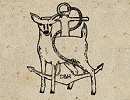Contact Seller
Doe And Hope
Tel07729 213013Please quote Antiques Atlas.


 Set 18th Century Hand Coloured Serpent Engravings
Set 18th Century Hand Coloured Serpent Engravings
 Pair 18th Century Hand Coloured Serpent Engravings
Pair 18th Century Hand Coloured Serpent Engravings
 1869 Evansville on the Ohio by R Hinshelwood
1869 Evansville on the Ohio by R Hinshelwood
 1869 Engraving of the Upper Mississippi
1869 Engraving of the Upper Mississippi
 1869 American Engraving of Yosemite Valley Framed
1869 American Engraving of Yosemite Valley Framed
 1869 Engraving of Indian Rock Narragansett Bay
1869 Engraving of Indian Rock Narragansett Bay
 British Moths - Eight 19thC Hand-Coloured Plates 1843
British Moths - Eight 19thC Hand-Coloured Plates 1843
 Howard Phipps Engravings
Howard Phipps Engravings
 Hans Holbein 18th Portrait Engraving Hampton Court
Hans Holbein 18th Portrait Engraving Hampton Court
 Mezzotint Portrait Master John Crewe Henry VIII c1776
Mezzotint Portrait Master John Crewe Henry VIII c1776
 Historic Engraving of William Pendrill
Historic Engraving of William Pendrill
 Set of Nine 19th Century Framed Engravings
Set of Nine 19th Century Framed Engravings
Non UK callers :
+44 7729 213013
Group of 16x 18thC Engravings of Fencing Duels


From Angelo Domenico’s (1717?-1802) renowned fencing manual "L'Ecole des Armes" the group of sixteen engravings, each marked with a plate number and now professionally mounted and presented glazed in contemporary black frames, all plates marked with a number and “publish’d according to act of parliament Feb. 1763” by Delin, J. Gwyn, in 1763.
The engravings are in very decorative and unrestored condition with none of them being in perfect order, some are lighter than others with some being much more discoloured and as such there is a beautiful monochrome contrast when they are placed on the wall. There is soiling and foxing and losses to many of the engravings but we love the overall feel, please see the photographs for full visual reference. The simple good quality frames are all contemporary and each is glazed.
The plate numbers included in numerical order are follows: 5, 6, 9, 16, 19, 20, 21, 22, 25, 27, 28, 32, 34, 39, 41 and 47 respectively.
During the eighteenth-century, fencing was a popular sport among the English royalty and aristocracy, primarily learned on the Continent until the Italian fencing master Domenico Angelo Malevolti Tremamondo established his fencing school in London. A riding instructor by trade, Angelo was born in Leghorn, Italy in 1716 and briefly trained with the celebrated fencer Monsieur Teillagory in Paris. After arriving in England in 1755, he participated in and won several public fencing matches, quickly earning a reputation that helped him secure high-ranking clients such as the Duke of Devonshire and the Earl of Pembroke. He soon capitalized on his popularity by establishing Angelo's School of Arms, where he taught horsemanship as well as fencing to an affluent and fashionable clientele. Angelo also continued to teach privately and in 1758, instructed the Prince of Wales and the Duke of York. Over the years, his school became a venerable British institution, which was run by successive generations of the Angelo family until the early twentieth-century.
In 1763, Angelo published L'Ecole d'Armes, a respected fencing handbook comprised of beautifully illustrated plates by renowned English artists like Chamber, Gwyn (As we see here) and Ryland depicting principal fencing positions, and esteemed by many as the ultimate authority on fencing.
Simply stunning as a group as a wall of clinking steel En Garde!
SellerDoe And Hope
View all stock from
Doe And Hope

 Private dealer, By appointment only
Private dealer, By appointment only
The Onion Barn, Shoe Cottage,
15 High Street, Blunham,
Bedfordshire, MK44 3NL.
MK44 3NL
Tel : 07729 213013
Non UK callers : +44 7729 213013
Get directions to Doe And Hope
The engravings are in very decorative and unrestored condition with none of them being in perfect order, some are lighter than others with some being much more discoloured and as such there is a beautiful monochrome contrast when they are placed on the wall. There is soiling and foxing and losses to many of the engravings but we love the overall feel, please see the photographs for full visual reference. The simple good quality frames are all contemporary and each is glazed.
The plate numbers included in numerical order are follows: 5, 6, 9, 16, 19, 20, 21, 22, 25, 27, 28, 32, 34, 39, 41 and 47 respectively.
During the eighteenth-century, fencing was a popular sport among the English royalty and aristocracy, primarily learned on the Continent until the Italian fencing master Domenico Angelo Malevolti Tremamondo established his fencing school in London. A riding instructor by trade, Angelo was born in Leghorn, Italy in 1716 and briefly trained with the celebrated fencer Monsieur Teillagory in Paris. After arriving in England in 1755, he participated in and won several public fencing matches, quickly earning a reputation that helped him secure high-ranking clients such as the Duke of Devonshire and the Earl of Pembroke. He soon capitalized on his popularity by establishing Angelo's School of Arms, where he taught horsemanship as well as fencing to an affluent and fashionable clientele. Angelo also continued to teach privately and in 1758, instructed the Prince of Wales and the Duke of York. Over the years, his school became a venerable British institution, which was run by successive generations of the Angelo family until the early twentieth-century.
In 1763, Angelo published L'Ecole d'Armes, a respected fencing handbook comprised of beautifully illustrated plates by renowned English artists like Chamber, Gwyn (As we see here) and Ryland depicting principal fencing positions, and esteemed by many as the ultimate authority on fencing.
Simply stunning as a group as a wall of clinking steel En Garde!
Price The price has been listed in British Pounds.
Conversion rates as of 17/DEC/2025. Euro & Dollar prices will vary and should only be used as a guide.
Always confirm final price with dealer. Phone or visit the website to buy, Free UK shipping.
Category Antique Pictures / Engravings / Art
> Antique Engravings
Date c.1763
George III Antiques Material Paper
Origin Italian
Item code as155a1498
Status Sold
£1900.00 
$2546.00 
€2166.19 

$

€

Conversion rates as of 17/DEC/2025. Euro & Dollar prices will vary and should only be used as a guide.
Always confirm final price with dealer. Phone or visit the website to buy, Free UK shipping.
View all stock from
Doe And Hope

 Private dealer, By appointment only
Private dealer, By appointment onlyThe Onion Barn, Shoe Cottage,
15 High Street, Blunham,
Bedfordshire, MK44 3NL.
MK44 3NL
Tel : 07729 213013
Non UK callers : +44 7729 213013
Get directions to Doe And Hope
You may also be interested in
 Set 18th Century Hand Coloured Serpent Engravings
Set 18th Century Hand Coloured Serpent Engravings
 Pair 18th Century Hand Coloured Serpent Engravings
Pair 18th Century Hand Coloured Serpent Engravings
 1869 Evansville on the Ohio by R Hinshelwood
1869 Evansville on the Ohio by R Hinshelwood
 1869 Engraving of the Upper Mississippi
1869 Engraving of the Upper Mississippi
 1869 American Engraving of Yosemite Valley Framed
1869 American Engraving of Yosemite Valley Framed
 1869 Engraving of Indian Rock Narragansett Bay
1869 Engraving of Indian Rock Narragansett Bay
 British Moths - Eight 19thC Hand-Coloured Plates 1843
British Moths - Eight 19thC Hand-Coloured Plates 1843
 Howard Phipps Engravings
Howard Phipps Engravings
 Hans Holbein 18th Portrait Engraving Hampton Court
Hans Holbein 18th Portrait Engraving Hampton Court
 Mezzotint Portrait Master John Crewe Henry VIII c1776
Mezzotint Portrait Master John Crewe Henry VIII c1776
 Historic Engraving of William Pendrill
Historic Engraving of William Pendrill
 Set of Nine 19th Century Framed Engravings
Set of Nine 19th Century Framed Engravings








